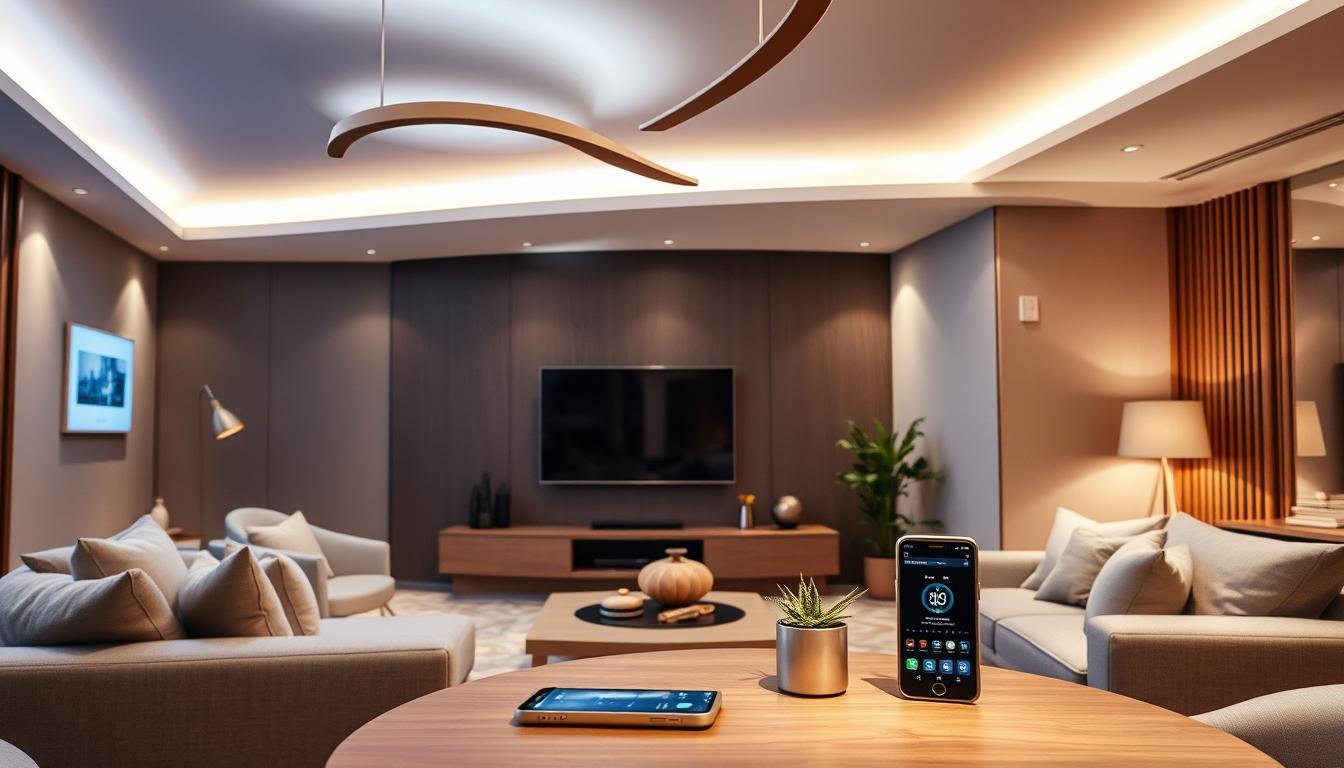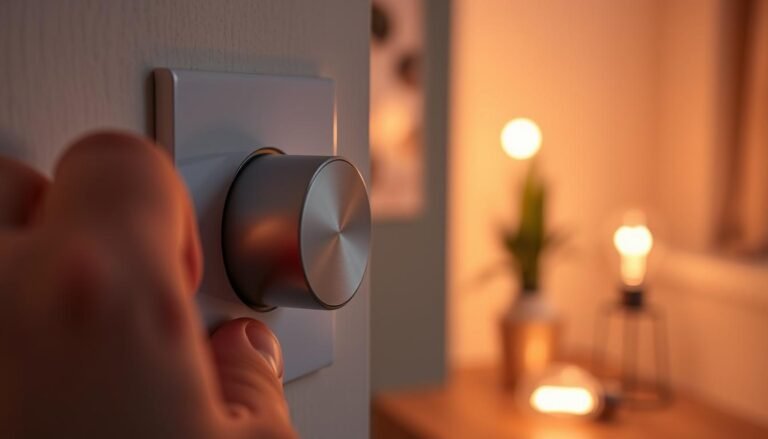Affiliate Disclosure: This post may contain affiliate links. If you make a purchase, we may earn a small commission at no extra cost to you.
Did you know most talks about smart lighting involve DALI systems and MQTT? This shows DALI is becoming a top choice for smart home tech.
With DALI, you can control your lights smartly and make your home just how you like it.
DALI has two main ways to talk to lights, making it very flexible. The Broadcast mode lets you control all lights with one signal. The Single Addressing Mode lets you control each light on its own. This means you can save energy, change the mood, and make your smart home better.
Adding DALI lighting to your smart home makes it better. By using DALI to MQTT gateways, you can link your DALI lights to systems like Home Assistant. This opens up new ways to control your lights and make your home smarter.
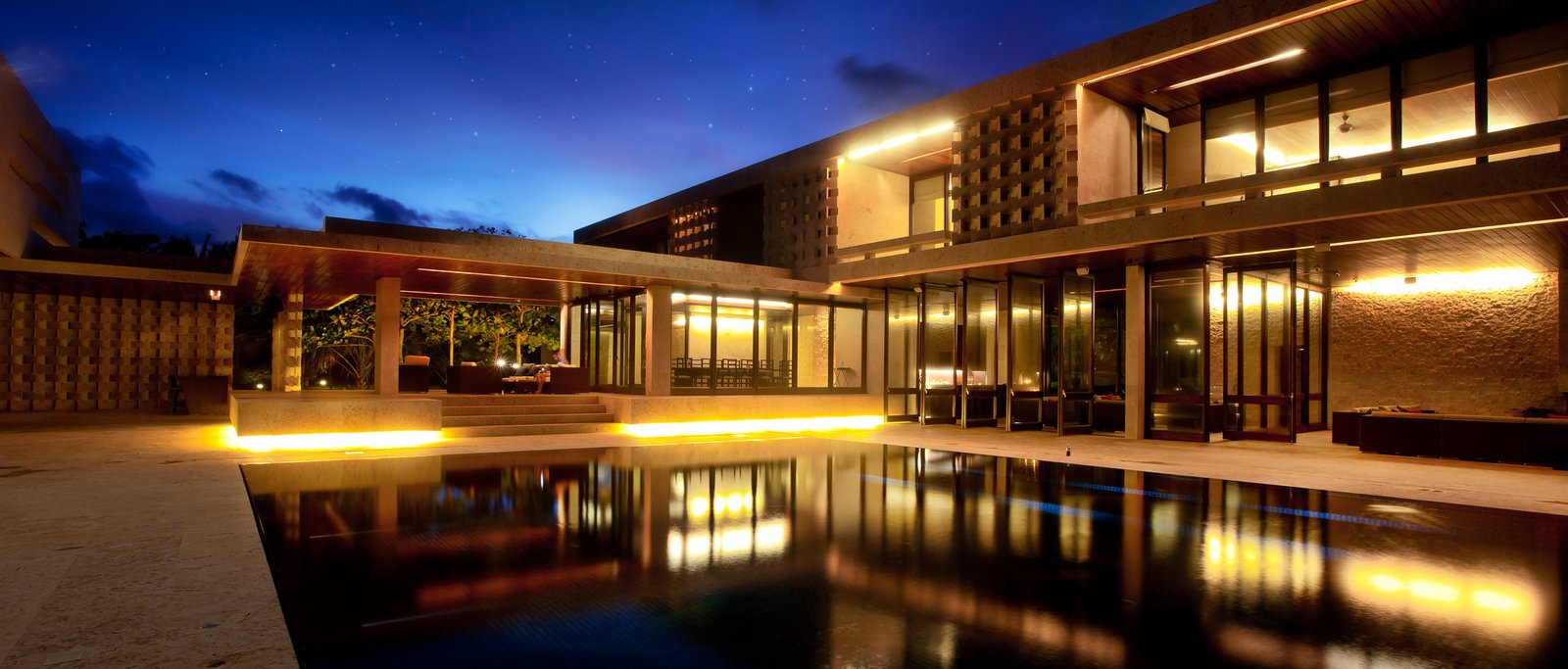
Let us help you find great lighting choices that fit your needs and style
Key Takeaways:
- DALI is a popular protocol for smart home automation, enabling intelligent lighting control and energy efficiency.
- DALI offers two communication principles: Broadcast mode for group control and Single Addressing Mode for individual luminaire command.
- Integrating DALI lighting with home automation systems like Home Assistant is possible through DALI to MQTT gateways.
- DALI-powered smart lighting allows for automated scenarios and remote control for a customized living experience.
- DALI’s mesh network architecture ensures flexibility and scalability as your smart home system grows.
Understanding DALI Protocol and Smart Lighting Solutions
The Digital Addressable Lighting Interface, or DALI, has changed how we control lighting. It’s used in homes and businesses. Since the 1990s, DALI has become a top choice for smart lighting. It offers many benefits.
What is Digital Addressable Lighting Interface
DALI is an open protocol, meaning any maker can use it. This has made it widely accepted in the lighting world. The latest version, DALI-2, makes sure systems work well together. This is thanks to strict rules for makers.
Benefits of DALI Protocol in Home Automation
- DALI systems can be set up in different ways, like star or tree shapes. This makes installation flexible.
- Each device in a DALI system has its own address. This lets you control lighting exactly how you want.
- DALI systems have advanced features like grouping and scene-setting. They’re better than older systems like 1-10V.
- They help save energy by controlling lighting precisely. This is good for homes and businesses.
Key Components of DALI Systems
DALI systems have a few main parts. There’s the DALI bus, control gear, and control devices. These work together to make a smart lighting system that fits your needs.
| Component | Description |
|---|---|
| DALI Bus | The DALI bus is the system’s main way of talking. It runs at about 16V and is strong against electrical noise. |
| DALI Control Gear | DALI-compliant gear, like drivers, are key for making DALI lights work right. |
| DALI Control Devices | Devices like motion detectors and dimmers give the system the control it needs. |
Knowing about the DALI protocol and its parts helps with smart lighting. It makes for energy-saving and customizable lighting in homes and businesses.
Essential Hardware Requirements for DALI Lighting
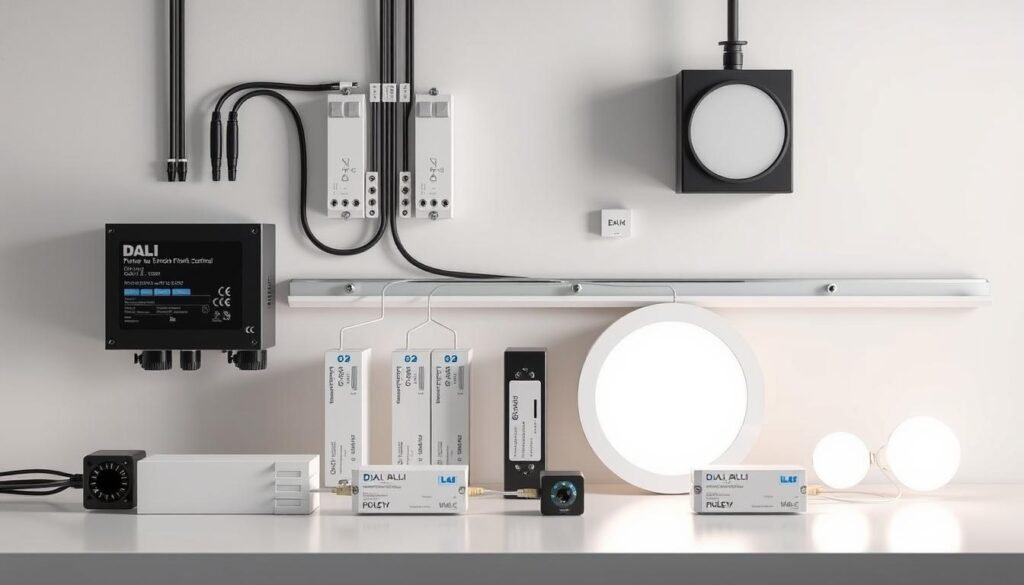
To set up a DALI lighting system, you’ll need several key hardware components. First, you’ll need DALI-compliant LED luminaires or ballasts. These are special lighting fixtures designed to work well with the DALI protocol.
Next, you’ll need a DALI power supply, like the Tridonic DALI PS2. It provides the power and control signals for your DALI network. For bigger installations, you might also need DALI repeaters to keep the signal strong.
To connect everything, you’ll need a DALI gateway. These devices convert DALI signals into protocols like MQTT. This makes it easy to link your DALI lighting with smart home systems. Brands like ADFweb offer DALI gateways that make connecting your system easier.
Lastly, you’ll need DALI controllers or interfaces to program your system. These tools let you set up the addresses, groups, and scenes of your DALI network.
When picking DALI components, make sure they are DALI-2 certified. This ensures they work well together and offer all the features you need for a reliable DALI lighting system.
| DALI Component | Purpose |
|---|---|
| DALI-compliant LED luminaires or ballasts | Provide DALI-compatible lighting fixtures |
| DALI power supply | Deliver power and control signals to the DALI network |
| DALI gateway | Convert DALI signals to protocols like MQTT for smart home integration |
| DALI controllers or interfaces | Program and commission the DALI system |
| DALI repeaters (for larger installations) | Extend the DALI network and maintain signal strength |
By choosing and using these DALI-compliant components, you can build a smart lighting system. It will work well with your home automation setup.
Setting Up Your DALI Network Architecture
Setting up a DALI lighting system in your smart home needs careful planning. You must set up the network architecture right. The DALI bus, network topology, and gateway configuration are key for reliable communication and control.
DALI Bus Installation Guidelines
You’ll need a two-wire bus cable for the DALI bus. It should run alongside your mains cables. This setup allows devices to talk to each other and the control system. It’s important to wire correctly to keep the signal strong and avoid problems.
Network Topology and Wiring
The DALI network can be set up in line, star, or tree ways. It can stretch up to 300 meters, with 64 devices on each line. This makes it easy to fit your network to your home’s layout and needs.
Gateway Configuration Steps
To link your DALI lights with your smart home, you need to set up a DALI gateway. For example, with an ADFweb DALI/MQTT gateway, you’ll need to enter MQTT broker details and DALI scanning settings. This ensures your DALI devices work well with your smart home system.
By following these steps for installing the DALI bus, setting up the network, and configuring the gateway, you can make a reliable and flexible dali bus system. It will work well with your smart home’s network topology and central gateway configuration.
Integration with Home Assistant and Building Management Systems
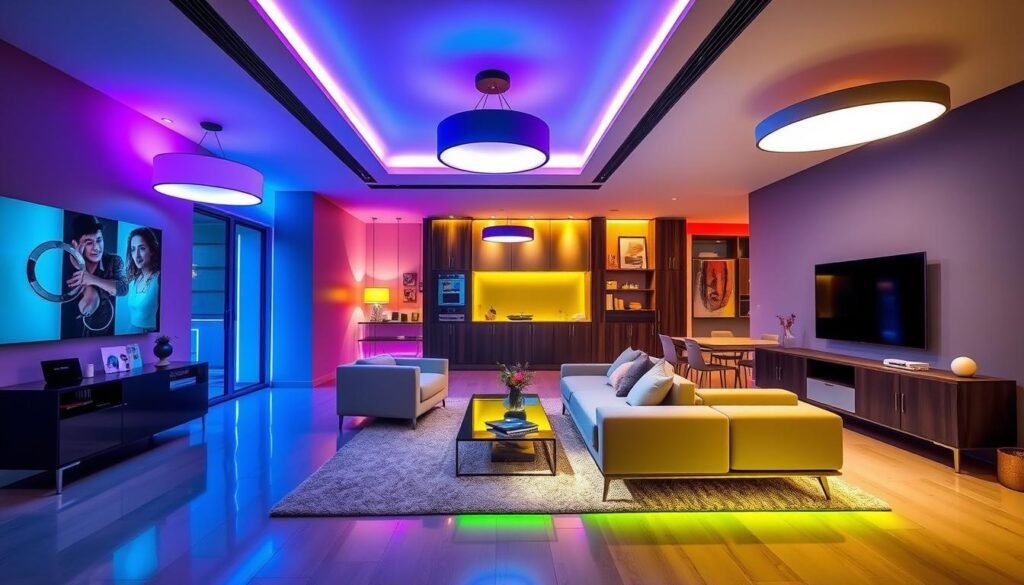
Integrating DALI lighting into your smart home is easy with platforms like Home Assistant and building management systems. These tools use established protocols and gateways. This lets you control and automate your DALI lighting fixtures better.
For Home Assistant users, the process often involves MQTT as an intermediary. Set up your DALI/MQTT gateway to talk to Home Assistant’s MQTT broker. This lets you control and watch your DALI lighting from the Home Assistant interface. Lunatone’s DALI 4Net controller, for instance, features 4 DALI lines with Ethernet connectivity and supports up to 265 DALI devices.
To boost your automation, add Node-RED to your Home Assistant setup. This tool lets you make complex control logic. It makes your DALI lighting integration smooth.
DALI can also be integrated with building management systems through KNX/DALI gateways. This gives you central control and monitoring. MDT offers various DALI Control Gateways that support both DALI and DALI-2 standards, enabling integration with KNX systems for comprehensive building automation.
The KNX integration for Home Assistant is detailed. It offers strong support for different device types and advanced settings. You can set up connection details, use KNX Secure, and automate processes with telegram triggers.
“The scan_interval for Modbus interface used for integration with Home Assistant is around 10 seconds, which can be considered a bit slow for smooth lighting control. According to user robi, the MODBUS integration in Home Assistant is considered flaky and unreliable, making KNX a more preferred option for DALI lighting integration.”
By integrating your DALI lighting with Home Assistant and building management platforms, you open up a world of smart home automation. You get better energy management and central control. Your space becomes efficient and intelligent.

Let us help you find great lighting choices that fit your needs and style
Advanced Control Features and Energy Management
DALI systems bring advanced control features to your smart home. They help save energy and make lighting better for your home. You can set scenes for different activities, like movie nights or dinner parties.
They also adjust lights based on natural light and turn them on when you enter a room. This makes your home’s lighting smart and energy-saving, without losing comfort.
DALI lets you change the color of your lights, creating the right mood. This is great for your health and mood, thanks to Human Centric Lighting. You can also track your energy use, helping you save more.
When you link DALI with other smart home systems, like HVAC and shades, you save even more energy. This creates a home that’s both comfortable and eco-friendly.
FAQ
What is DALI protocol and how does it work?
What are the benefits of integrating DALI into a smart home system?
What are the key components of a DALI lighting system?
How do I set up a DALI lighting system in my home?
How can I integrate DALI with Home Assistant and building management systems?
What advanced control features are available with DALI systems?
Source Links
- DALI lighting system integration – https://community.home-assistant.io/t/dali-lighting-system-integration/146340
- The role of DALI in Smart Lighting systems – https://embe.tech/news-blog/the-role-of-dali-in-smart-lighting-systems/
- Introduction – Digital Illumination Interface Alliance – https://www.dali-alliance.org/dali/
- How DALI Enables Efficient, Future-Proof Lighting Control Systems – https://lightingcontrolsassociation.org/2023/06/26/sustainable-smart-and-standardized-how-dali-enables-efficient-future-proof-lighting-control-systems/
Check out our FREE Calculators on our Resources Page

